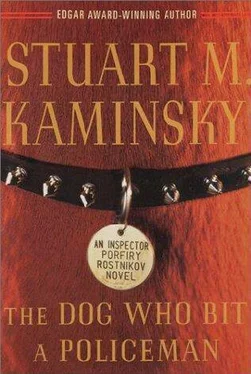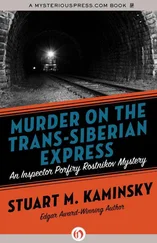Stuart Kaminsky - The Dog Who Bit a Policeman
Здесь есть возможность читать онлайн «Stuart Kaminsky - The Dog Who Bit a Policeman» весь текст электронной книги совершенно бесплатно (целиком полную версию без сокращений). В некоторых случаях можно слушать аудио, скачать через торрент в формате fb2 и присутствует краткое содержание. Жанр: Полицейский детектив, на русском языке. Описание произведения, (предисловие) а так же отзывы посетителей доступны на портале библиотеки ЛибКат.
- Название:The Dog Who Bit a Policeman
- Автор:
- Жанр:
- Год:неизвестен
- ISBN:нет данных
- Рейтинг книги:3 / 5. Голосов: 1
-
Избранное:Добавить в избранное
- Отзывы:
-
Ваша оценка:
- 60
- 1
- 2
- 3
- 4
- 5
The Dog Who Bit a Policeman: краткое содержание, описание и аннотация
Предлагаем к чтению аннотацию, описание, краткое содержание или предисловие (зависит от того, что написал сам автор книги «The Dog Who Bit a Policeman»). Если вы не нашли необходимую информацию о книге — напишите в комментариях, мы постараемся отыскать её.
The Dog Who Bit a Policeman — читать онлайн бесплатно полную книгу (весь текст) целиком
Ниже представлен текст книги, разбитый по страницам. Система сохранения места последней прочитанной страницы, позволяет с удобством читать онлайн бесплатно книгу «The Dog Who Bit a Policeman», без необходимости каждый раз заново искать на чём Вы остановились. Поставьте закладку, и сможете в любой момент перейти на страницу, на которой закончили чтение.
Интервал:
Закладка:
“Even when she had little money, Yulia took care of her teeth,”
said Katerina. “She always said, ‘As long as I have good teeth and take care of my face and body, I have a chance to escape from this life.’ She escaped. Keep the photograph. I must leave.”
“You have the address of the apartment building on Kalinin?”
asked Iosef.
“I’ve written it on the back of the photograph,” Katerina said.
“Yulia also spends time at the bar in the Metropole and at the Cafe Royale. The German likes it there.”
Katerina held up her hand to show them the door. She plucked a lightweight coat from a rack in a corner. Iosef pocketed the photo and went through the door with Zelach.
“Please do not come back,” she said softly. “I am afraid of the German; afraid for my son, afraid for me.”
“We won’t come back,” said Iosef, reaching into his pocket, taking out his wallet and removing several bills, which he handed to Katerina. “Take a cab.”
She gave him a long look to determine if he thought this enti-tled him to a return, unofficial visit. She was a good judge of such things. This time she was almost certain that she saw nothing but sympathy in his eyes.
She stuffed the money into her purse and hurried ahead of them, closing the door and putting on the coat. Without glancing back she entered the dark stairwell and went down. The policeman could hear her shoes clapping against the concrete.
“Kalinin Prospekt?” asked Zelach.
“Kalinin,” Iosef answered.
Fifteen minutes later they were at the address of the apartment on Kalinin. The building was tall, relatively new, and sported a uniformed doorman, who was large, pleasant looking, and carrying a weapon which bulged under his gold-buttoned coat.
Iosef and Zelach showed their identification. The man examined the cards carefully and handed them back.
“This woman,” Iosef said, showing him the photograph.
The doorman nodded.
“Miss Yalutshkin,” he said. “She’s not in now. She left less than ten minutes ago.”
“Does she have a guest staying with her now?” asked Iosef. “A man?”
“Miss Yalutshkin entertains a great deal. She also tips well,” said the doorman. “It is my belief that she tips well to insure privacy.
However, if you are asking if anyone is in her apartment now, the answer is no.”
“Do you know this man?” asked Iosef, taking out a photograph of Yevgeny Pleshkov.
The doorman took the picture, looked at it, and said, “Yes, I’ve seen him on the television.”
“Has he ever visited Miss Yalutshkin?” asked Iosef.
“Perhaps,” said the doorman. “I try to mind my own business.”
“So you wouldn’t remember a German who visited her?”
“A German? So many people,” said the doorman. “So many people and such long days. You know it can be very boring being a doorman? I’m not complaining. Except for buying my own uniform, the money and tips are good. But people, tenants, want privacy.”
“Don’t tell her we were looking for her,” said Iosef pleasantly.
“I won’t,” said the doorman.
Another ten minutes later Iosef and Zelach were at the Metropole Hotel directly across from the Bolshoi Theater.
The Metropole was designed in 1898 by an English architect.
Its reputation for elegance has been maintained for a century, and shortly after the revolution, Lenin and his top lieutenants moved into apartments in the one-block-square, four-story stone edifice with its stained-glass windows and marble fountains.
Today the Metropole is part of the Russian-Finnish Inter-Continental Hotels and Resorts. The large rooms were renovated in 1991, but the workmanship and materials were cheap and the rooms are already looking a bit shabby. The suites, however, are well maintained for rich Russians and visiting foreigners drawn by the hotel’s reputation. The suites feature genuine antiques and Oriental carpets.
Iosef was well acquainted with the Metropole. He had attended endless rounds of discussions and parties in the Artists Bar, downstairs off of Teatralny Proyezd. The purpose of one of these discussions was to convince a rich Englishman to produce one of Iosef ’s plays in London. Iosef found the bar dismal and the food mediocre even in the hotel’s main restaurant, the Boyarsky Zal.
Nothing had come of the meetings. The Englishman had simply disappeared one day, and Iosef was left with memories of the stuffed bear in the hotel restaurant.
The desk man to whom they spoke did not seem to be the least impressed by Iosef ’s and Zelach’s police identification cards, but, on the other hand, he was not uncooperative. What he was, was busy-sorting registration forms, credit-card receipt copies, and bills charged to the rooms.
“Yes, I know Miss Yalutshkin,” the frail man said. He wore a neatly cut French suit and a very sedate blue tie in addition to a look of harassed distress.
“Do you know if she has been in the hotel today?” asked Iosef.
The man shrugged, examining what appeared to be a barely leg-ible signature on a small yellow sheet.
“Can you read this?” he asked in exasperation, handing the sheet to Zelach, who took it and frowned.
“It says ‘Fuad Ali Ben Mohammed, room three forty-three,’ ”
said Zelach, looking at the sheet.
“The amount?” the clerk asked hopefully.
“Two million and sixty rubles,” said Zelach, handing the yellow sheet back to the clerk.
“Thank you,” the clerk said gratefully. “I saw her going into the bar about an hour ago. I don’t know if she is still there. I would prefer if you did not mention that I told you her location.”
“We will not mention,” said Iosef, moving in the direction of the bar with Zelach at his side.
“Zelach,” Iosef said, “your skills are a constant source of surprise to me. First you kick a ball like a professional, and now I discover you can decipher obscure handwriting.”
“I have always been able to read poor handwriting,” said Zelach.
“I don’t know why. That bill I just looked at, I think the writer purposely made it difficult to read.”
“I would guess that was not his only bill,” said Iosef, opening the door to the darkness of the bar.
There were only a handful of people at this hour. A CD unit in the corner with two dark square speaker boxes was playing Louis Armstrong, singing “Wonderful World.”
“There,” said Iosef, looking at Yulia Yalutshkin alone at a table against the wall.
There was no doubt even at this distance that she was a very rare, pale beauty, far too thin, however, for Iosef ’s taste. Elena would never be a model, but she had a solid beauty that Iosef far preferred to the butterfly appearance of the Yulia Yalutshkins of modern Russia.
She saw them coming, hesitated for only a fraction of an instant, and went on slowly drinking.
“Yulia Yalutshkin?” Iosef asked.
The woman didn’t answer.
“May we sit?” asked Iosef.
The woman shrugged her slight shoulders. The two policemen sat.
She had still not looked at them. She seemed to be fascinated or hypnotized by something beyond the far wall.
“We are the police,” Iosef said.
A smile touched Yulia’s perfect, full red lips.
“You couldn’t be anything else,” she said in a throaty voice that reminded Iosef of the American actress-Zelach would know her name. Yes, Lauren Bacall.
“I used to be a soldier,” said Iosef.
“Now,” she said taking another sip from the glass of amber liquid before her, “you look like a policeman, and your partner could be nothing but a policeman. It is the curse of being a policeman.”
Zelach shifted uncomfortably. He slouched.
“Do you know what we want?” asked Iosef.
Читать дальшеИнтервал:
Закладка:
Похожие книги на «The Dog Who Bit a Policeman»
Представляем Вашему вниманию похожие книги на «The Dog Who Bit a Policeman» списком для выбора. Мы отобрали схожую по названию и смыслу литературу в надежде предоставить читателям больше вариантов отыскать новые, интересные, ещё непрочитанные произведения.
Обсуждение, отзывы о книге «The Dog Who Bit a Policeman» и просто собственные мнения читателей. Оставьте ваши комментарии, напишите, что Вы думаете о произведении, его смысле или главных героях. Укажите что конкретно понравилось, а что нет, и почему Вы так считаете.












